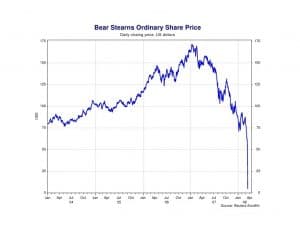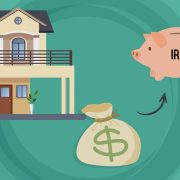Self-Directed Real Estate IRAs Provide Refuge from Stock Market Volatility
The higher the stock market goes, the more important it is to diversify into real estate and other asset classes. A Self-Directed Real Estate IRA provides important tax advantages, while still preserving the diversification benefit, income, long-term capital appreciation and access to leverage that real estate investing historically provides.
Rental property has important advantages and features that in combination are unusual in most stocks and mutual funds:
- Regular income, over and above the costs of ownership in many cases;
- Long-term capital appreciation;
- Depreciation benefits;
- Tax-free exchanges;
- Asset protection: While any given stock can become worthless almost overnight…

… a house and land has tangible value that, absent a volcanic eruption, almost never goes to zero. People will always need a place to live, businesses will always need a place to operate. And that’s true no matter what the stock market does. Even an out and out market crash like we have not seen since 1929 did not destroy the market for housing – people needed to live somewhere.
And that’s the logic of real estate investing.
Meanwhile, the monthly rental income provides a valuable ballast that can see you through times of market volatility: Even when prices fall, you get paid a steady rental income to wait it out. You can even use that rental income to buy more property at a discount.
Taken as a whole, real estate tends to be less volatile than the stock market. But individual investments can vary substantially. The stability of real estate is largely in the steady cash flow of rental income, as well as the ready access to cash, since it’s usually not hard to get a loan against equity.
Some of the advantages do not apply within Self-Directed Real Estate IRAs. For example, there are no tax-free exchanges like you can make in taxable accounts. But that’s because Self-Directed IRAs already provide shelter from current year taxation. There’s no need for tax deferred exchanges, because sales of IRA properties are already generally tax-deferred (or for Roth accounts, tax-free).
Self-Directed IRAs also provide some added protection from the claims of creditors – which is important for those who own multiple properties.
Caution
Direct ownership of Self-Directed Real Estate IRAs is not for everybody.
First, direct ownership of rental real estate either requires the willingness to be a landlord (and answer the phone for those 2 AM plumbing emergencies that always seem to come up) or hire a property manager to handle those problems, tenant screening and collections from late-payers on your behalf at around 10-15 percent of the monthly rent.
But if you buy at a good price, the rental income you receive can even more than offset this cost of doing business as well.
Real estate is also not very liquid. The monthly rental income is quite liquid, and that can go a long way to cushioning the blow, if you need cash for some reason or other. But if you need to access a very large sum all at once, real estate takes a lot of time and expense to sell. You can potentially get an equity loan in a few days, assuming you have equity in the property. But you cannot personally access loan proceeds in a Self-Directed Real Estate IRA. The money has to remain within your IRA.
If you want access to the real estate market without direct ownership of real estate itself, you may consider REITs, or Real Estate Investment trusts. These can be excellent income vehicles that still have potential for capital appreciation.
Their key advantage: Unlike C corporation stocks, REIT stocks can pass income to you free of federal income tax at the corporation level. Corporations have to pay corporate income tax on earnings before they pay it out as dividends. That corporate income tax was 35% until late 2017, when the Tax Cuts and Jobs Act was passed into law. Now the corporate income tax is much lower – 21% – but still significant. You take a 21% haircut on earnings before you even see the cash from a C corporation stock dividend, which comprise the vast majority of publicly-traded stocks. And then you have to pay personal income taxes on the dividend. The double taxation is quite a nasty bite.
But if you hold the asset in a real estate Roth IRA, there is generally no federal income tax due at all. *
*If you have a mortgage, you may be subject to unrelated debt-financed income tax, in proportion to the amount of income you received that is attributable to borrowed money, rather than your own equity. So, if you have a mortgage balance of 33% of the value of the property, you may be subject to UDIT on 33% of the income, and on 33% of the gain if you sell at a profit.
Interested in learning more about Self-Directed IRAs? Contact American IRA, LLC at 866-7500-IRA (472) for a free consultation. Download our free guides or visit us online at www.AmericanIRA.com.







